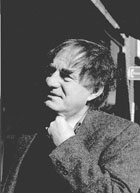Marek Jablonski (1939-1999) : Light and shadow by Lucie Renaud
/ March 1, 2000
Version française...
 Marek Jablonski, the internationally distinguished Canadian pianist and
teacher who died last year, was born in Nazi-occupied Crakow on November 5, 1939
and began studying piano as a youngster in the city's music conservatory. His
first recital took place in 1945 before a most unusual audience. The hall was
filled with officers of the Russian secret police -- the Jablonski family's
immediate neighbours. Marek's father was in the Polish armed forces, and the boy
was not to see him until 1947. The plight of Poland and Marek's experience of
the war and its aftermath left its indelible mark. His love for his native land
never faded, and it explains his unique relationship with the music of his
fellow Pole, Fr�d�ric Chopin.
Marek Jablonski, the internationally distinguished Canadian pianist and
teacher who died last year, was born in Nazi-occupied Crakow on November 5, 1939
and began studying piano as a youngster in the city's music conservatory. His
first recital took place in 1945 before a most unusual audience. The hall was
filled with officers of the Russian secret police -- the Jablonski family's
immediate neighbours. Marek's father was in the Polish armed forces, and the boy
was not to see him until 1947. The plight of Poland and Marek's experience of
the war and its aftermath left its indelible mark. His love for his native land
never faded, and it explains his unique relationship with the music of his
fellow Pole, Fr�d�ric Chopin.
When Marek was ten, his family decided to leave Poland. They emigrated to Canada
and settled in Edmonton, although their initial destination had been Vancouver.
Marek continued his studies with Gladys Egbert and attended the Banff Centre for
the Arts during the summer. He gradually acquired a reputation as a young
virtuoso. Luck played a part in 1955, when the great Artur Rubinstein happened
to hear the sixteen-year-old Marek. Rubinstein was enthusiastic about Marek's
talent and predicted a brilliant career for the young pianist. The maestro kept
in touch with him and was generous with advice.
Jablonski won the Dimitri Mitropoulos scholarship in 1958 and began advanced
studies at New York's Juilliard School with Rosina Lhevinne, an exceptional
piano teacher who was the wife of renowned pianist Joseph Lhevinne. In 1961, he
won first prize in Canada's national Jeunesses Musicales competition and made
his d�buts with a number of Canadian, American, and European orchestras. He
gave solo recitals in Paris (Salle Gaveau), London (Wigmore Hall), New York
(Carnegie Hall), Vienna (Grossemusikvereinsaal), Milan, and Montreal (Place des
Arts). During this period, Jablonski was one of the few soloists able to fill
the large concert halls of Canada.
Following a concert at the Salle Claude-Champagne in March 1969, music critic
Gilles Potvin wrote, "Jablonski's playing was notable for the clear picture
he gave us of the structure of Brahms' Sonata No. 3. He also revealed a
remarkable technique and powerful execution. With this performance he has
reaffirmed his position as one of Canada's most talented pianists. Here is an
artist with breadth, worthy of the world's great concert halls."
Jablonski's preferred repertoire included Liszt, Brahms, Beethoven, Mozart,
Schubert, Szymanowski, and Rachmaninoff, but Chopin was his favourite. In 1971,
the National Film Board of Canada produced Jablonski, a film about the
pianist. In Toronto he shared the limelight with Glenn Gould in a concert
featuring music of the 1920s. He was to continue concertizing for the rest of
his life.
Shadow: the teacher
Side by side with his concert career, Jablonski dedicated himself
passionately to teaching. In addition to his regular students in Edmonton at the
University of Alberta, he found the time and enthusiasm to give masterclasses in
Toronto (the Royal Conservatory of Music), Montreal, Bergamo, Milan, and Corfu.
The most popular of his masterclasses were those given each summer, from 1975
until his death, at the Banff Centre for the Arts. Jablonski was more than a
teacher for the young pianists. He willingly shared his evenings with them, and
would sometimes take the entire class out to dinner where they could talk about
music and life generally.
Jablonski was an incomparable teacher with a lively intelligence and a matchless
ability to communicate. He imparted not only the secrets of his technical
precision and warm but limpid touch, but also his passion for music and his
constant insistence on totally involving the ear. A few years ago, during a
masterclass in Banff devoted to Tchaikovsky's famous concerto, he daringly
suggested that one of the young pianists interpret the work as though a little
drunk in a smoky jazz club at three in the morning, trying to play the concerto
by ear, like a piece heard but never studied. The perplexed and possibly
skeptical student was nevertheless willing to try. Suddenly the music opened up
with newfound freedom. Technique was no longer an end in itself, but a tool.
A number of Jablonski's students now have flourishing careers, among them Jon
Kimura Parker, Kevin Fitzgerald, Bernadene Blaha, and Francine Kay. In 1999 a
Chopin prize for talented young pianists was established in his name and an
endowment fund set up. The first Marek Jablonski Prize for Chopin was awarded in
1999 to Thomas Yu, a promising student who is also studying dentistry at the
University of Saskatchewan. Jablonski was to have given the benefit concert for
the endowment fund in October 1999. Sadly, he died in May 1999. On January 27,
2000, his best-known student, Jon Kimura Parker, a founding member of Piano 6
(the performance group dedicated to bringing outstanding piano performances to
small Canadian communities) replaced Jablonski at the endowment concert.
Interviewed by the Edmonton Journal, Parker said of the man whom he continues to
call his mentor, "I respected him immensely, not only as a teacher, but
also as a master of life skills. He will always be an inspiration for me."
Translation: Jane Brierley
Version française... |
|


